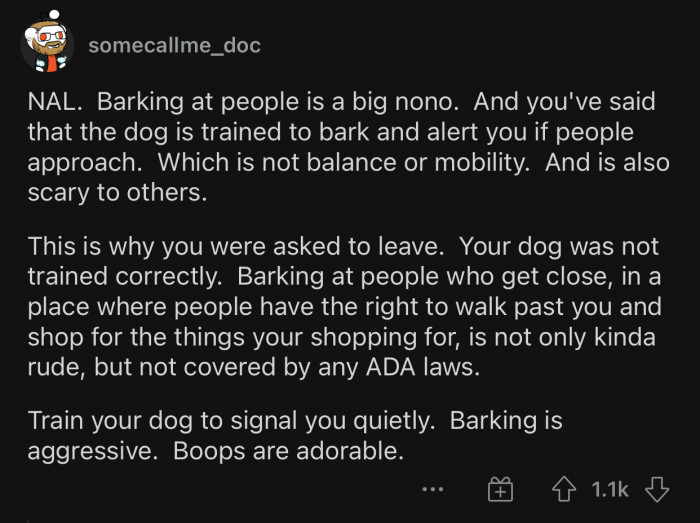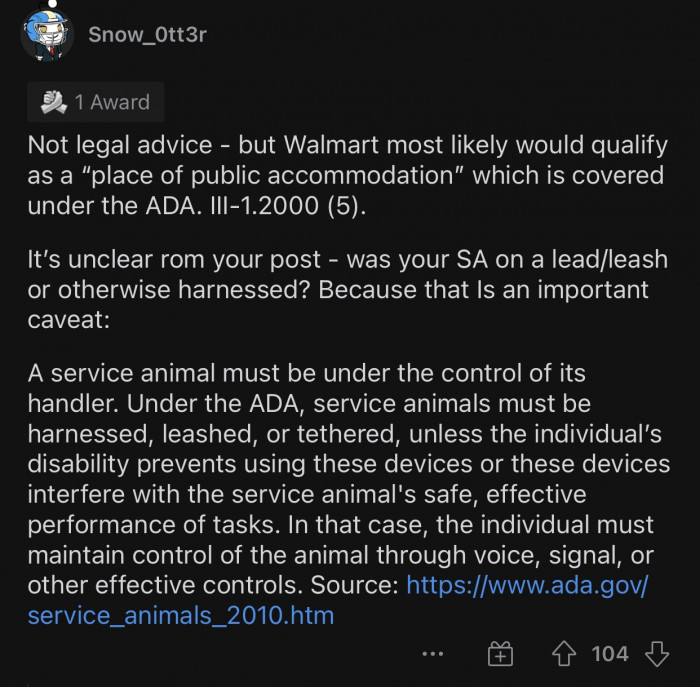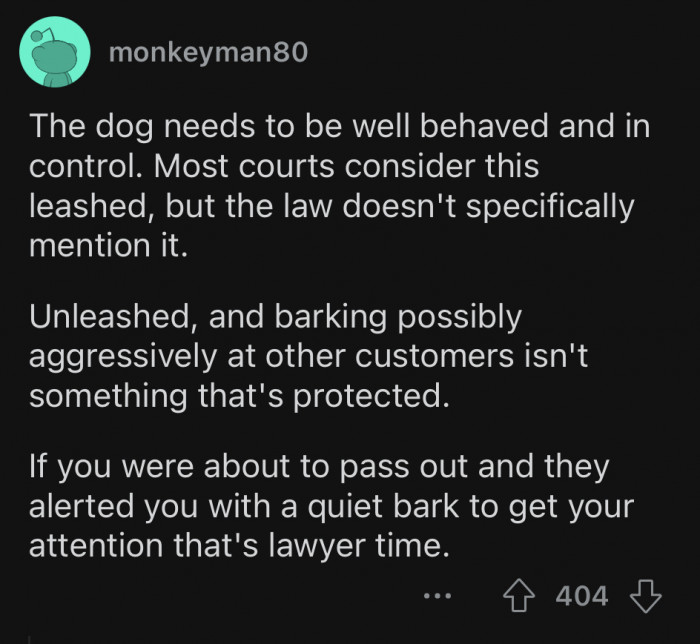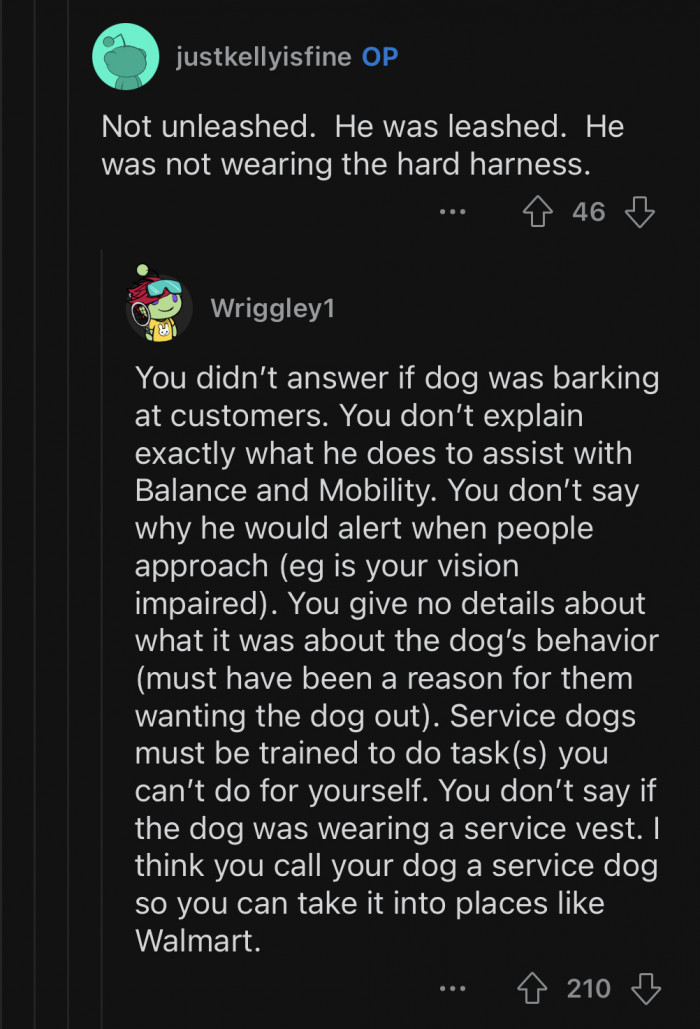Walmart Associate Calls Cops On Shopper And Has Them Trespassed For Shopping With Service Dog
Discrimination against people with disabilities is prohibited by the Americans with Disabilities Act (ADA) in several areas, including employment, public accommodations, transportation, communications, and access to state and local government services and programs. Dogs are recognized as service animals under Titles II and III of the ADA; they are individually trained to do work or perform tasks for people with disabilities. According to Dr. Alexandra Solomon, relationship therapist, "Service animals not only assist individuals with disabilities but also provide emotional support, enhancing their overall well-being." Service dogs are incredibly essential and fill many vital roles. They help blind people navigate their surroundings, alert deaf individuals to potential dangers, pull wheelchairs, alert and protect a person having a seizure, and perform many other duties. Under the ADA, service animals are allowed to accompany people with disabilities in all areas where the public is permitted to go. Businesses and nonprofit organizations that serve the public, as well as state and local governments, must generally allow it. A Redditor who goes by the username u/justkellyisfine made a post on the r/legaladvice subreddit, where they explained how a Walmart associate had them trespassed for shopping with a service dog. The Reddit community had a lot of different advice and reactions to u/justkellyisfine's post.
Scroll down to check out the full Reddit post, and scroll a little further to read screenshots of comments from the original post.
Here's the original Reddit post by u/justkellyisfine:

OP was told to leave a Florida Walmart after their service dog barked once.

The Walmart associate refused to cooperate despite OP offering to show him ADA law.

Understanding Service Dog Discrimination
The discrimination against individuals accompanied by service dogs can be understood through the lens of social psychology, particularly the concept of stigma. According to research published in the journal *Social Psychology Quarterly*, stigma surrounding disabilities often leads to negative attitudes and behaviors towards individuals with visible or invisible challenges. This stigma can manifest in various ways, including harassment or humiliation, as indicated by the experiences shared by individuals in similar situations.
A study from the University of California, Berkeley, illustrates that people often harbor misconceptions about service animals, believing they are merely pets rather than essential aids for those with disabilities. This misunderstanding can create a hostile environment for those who need these animals, reinforcing the need for educational initiatives aimed at dismantling these biases.
OP could not even speak with a manager and was told to simply leave.

The police eventually showed up and had OP trespassed.

OP did not know how to deal with the situation they found themselves in and asked the r/legaladvice community on Reddit for guidance:

Behavioral psychologists have noted that the reaction of store employees, in this case, reflects a more extensive cognitive bias known as the 'fundamental attribution error.' This occurs when individuals attribute another person's actions to their character rather than considering situational factors, such as the legitimacy of a service dog. Research suggests that fostering empathy and understanding through training can help mitigate these biases, leading to more supportive interactions with individuals who require assistance.
To address this, implementing comprehensive staff training programs that emphasize the rights of service dog users and the importance of respectful communication can be beneficial. Such programs have been shown to significantly improve customer service experiences, as evidenced by a study published in the *Journal of Applied Psychology*.
Here's how the r/legaladvice community responded to OP's situation:

Barking is typically considered aggressive and could scare store customers.

OP trained their dog to bark at people who get too close.

Psychological Impact of Discrimination
The psychological effects of discrimination can be profound and long-lasting. Research indicates that individuals who experience harassment or humiliation due to their disability often face increased rates of anxiety, depression, and post-traumatic stress disorder (PTSD). A study conducted by the American Psychological Association highlights that repeated exposure to discriminatory experiences can erode self-esteem and lead to a phenomenon known as 'internalized stigma,' where individuals begin to believe the negative perceptions held by others.
This underscores the importance of mental health support for those affected by such incidents. Therapy approaches like Cognitive Behavioral Therapy (CBT) have been shown to help individuals reframe negative thoughts and build resilience against the adverse impacts of discrimination, as noted in a meta-analysis published in *Cognitive Therapy and Research*.
Some users had follow-up questions that OP eventually addressed.

Having an unharnessed, barking dog in Walmart is a big no-no.

OP's dog was trained to assist with balance and mobility.

Social support plays a critical role in mitigating the effects of discrimination. According to research from the University of Michigan, individuals who have strong social networks report better mental health outcomes, even in the face of adversity. This suggests that fostering community connections can provide emotional resources that buffer against the psychological toll of discrimination.
Encouraging individuals to seek out support groups or community organizations that advocate for disability rights can be an effective way to enhance resilience. Studies show that peer support can help individuals feel less isolated and more empowered to stand up for their rights, leading to improved mental health and a sense of agency.
After OP provided more details about what kind of service dog they have, things became much clearer.

What OP's service dog did is not covered under the ADA.

Shopping with a random dog barking at you will certainly make you uneasy.

Educational Initiatives and Advocacy
Raising awareness about the rights of individuals with service animals is crucial in reducing instances of discrimination. Research conducted by the University of Pennsylvania emphasizes the effectiveness of educational initiatives that target both the general public and specific industries, such as retail. These programs can help dispel myths surrounding service animals and clarify the legal protections afforded to individuals with disabilities.
Advocacy groups have successfully implemented campaigns that include workshops and informational materials to educate both employees and customers about the rights of service dog users. Such initiatives not only promote understanding but also foster a more inclusive environment, reducing the likelihood of confrontations and misunderstandings.
OP should have left when told to leave, regardless of the situation.

The police have no obligation to enforce the ADA.

A service animal must be under the control of its handler.

Empowerment is a psychological principle that can significantly influence how individuals respond to discrimination. Research indicates that individuals who feel a sense of empowerment are more likely to assert their rights and speak up against injustice. According to a study published in the *Journal of Personality and Social Psychology*, empowerment can be cultivated through positive affirmations and skills training, which can enhance self-efficacy.
Therefore, advocating for personal empowerment programs that focus on building assertiveness and communication skills could provide individuals with the tools they need to navigate challenging situations. Engaging in role-playing exercises and learning effective communication strategies can help individuals feel more confident in confronting discrimination.
A moderator mentioned how OP did not provide enough information to the community.

Service dogs have to be well-behaved and should not spontaneously lose control.


The Role of Bystanders
The role of bystanders in situations of discrimination cannot be overstated. Research from the University of Toronto shows that bystanders who intervene can significantly alter the outcome of an incident, providing support to the victim and potentially dissuading the perpetrator from continuing their discriminatory behavior. The 'bystander effect' has been studied extensively, revealing that individuals are more likely to take action when they feel a sense of responsibility and believe their intervention can make a difference.
Encouraging bystander intervention training in public spaces like retailers can create a culture of accountability and support. These programs can teach individuals how to safely intervene and offer assistance to those being discriminated against, fostering a community that stands against injustice.
According to the information provided by OP, it seems that the Walmart associate made the right call because the service dog was potentially making customers nervous with its constant barking. If the dog was trained to bark whenever someone comes nearby, customers will certainly not feel at ease.
OP should probably get in contact with a lawyer and provide them with all the specifics of what happened.
Psychological Analysis
This incident highlights how deeply ingrained stigma and misconceptions about service animals can lead to discriminatory behavior. The Walmart associate's reaction likely stemmed from a lack of understanding about the role of service dogs, which reflects a broader societal issue where people often misinterpret visible disabilities or support animals. It's crucial that we promote education and empathy to reduce these biases and create more inclusive environments.
Analysis generated by AI
Building Healthier Patterns
Ultimately, addressing the discrimination faced by individuals with service dogs requires a multifaceted approach that combines education, advocacy, and psychological support. Mental health professionals emphasize the importance of fostering resilience and empowerment in those affected, while educational initiatives can help dismantle the stigma surrounding disabilities. Creating supportive communities where individuals feel safe and validated is essential for promoting inclusivity and reducing instances of discrimination.
As we continue to advocate for disability rights, it’s crucial to remember that empowerment, understanding, and community engagement can create meaningful change. By working together to educate ourselves and others, we can foster an environment that respects and honors the rights of all individuals, regardless of their needs.



